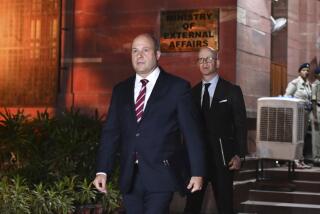Soviets Even Score; 6 More Britons Ousted
- Share via
MOSCOW — The Soviet Union on Wednesday ordered five more members of the British Embassy staff and a journalist to leave the country in a one-for-one response to London’s latest expulsion of Soviet citizens charged with spying.
In London, Foreign Secretary Geoffrey Howe condemned Moscow for what he called “this lamentable episode,” but the government announced a truce in the battle of tit-for-tat expulsions.
Prime Minister Margaret Thatcher, who is in Jordan on a Mideast trip, said no further Soviet citizens will be told to leave Britain as a result of Moscow’s latest reprisals.
“We have eliminated the core of their subversive and intelligence operation in Britain, so we shall not respond further to their wholly unjustified expulsions,” Thatcher said.
A senior Foreign Office spokesman reaffirmed this position at a news conference in London a few hours later. “We wish to draw a line under this affair,” said Christopher Meyer, head of the news department. “We have no plans at present for further expulsions.”
The British ambassador to Moscow, Bryan Cartledge, said in a statement that he was summoned to the Foreign Ministry at midday and handed a list of six Britons to be expelled in addition to 25 ordered out last weekend. The six ordered to leave include a first secretary at the embassy, an assistant air attache, three members of the embassy technical staff and a correspondent for the Reuters news agency, the second Reuters reporter ordered out in five days.
‘Vengeful, Spiteful’
Cartledge condemned the new expulsions as a “vengeful and spiteful act directed wholly against blameless people” who were working to improve Anglo-Soviet relations.
The Soviet action brings to 31 the number of British diplomats, journalists and businessmen ordered expelled from Moscow in retaliation for Britain’s expulsion of the same number of Soviets since Sept. 12.
Diplomatic observers said they believe this is the largest number of Western Europeans to be ousted at one time from the Soviet Union in the postwar period. The British Embassy in Moscow, with 23 of its 71 personnel now ordered to leave the country by early October, will lose almost one-third of its diplomatic and technical staff.
By contrast, when Britain expelled 105 Soviet representatives on spying charges in 1971, Moscow retaliated by expelling only 18 Britons from Moscow. When France ousted 47 Soviet citizens for spying in 1983, no French representatives were expelled from the Soviet Union.
Moscow’s one-for-one reciprocity in the current row is consistent with an image of toughness that the new Soviet leader, Mikhail S. Gorbachev, seeks to project. The Soviet action is likely to be well received by ordinary citizens here, who often complained that Gorbachev’s ill and enfeebled predecessors--Leonid I. Brezhnev, Yuri V. Andropov and Konstantin U. Chernenko--let the Western powers push them around.
Britain began the round of reciprocal expulsions last Thursday by identifying 25 Soviet diplomatic staff, trade officials and journalists as intelligence agents and ordering them to leave within three weeks.
British officials said they acted on information provided by Oleg A. Gordievski, 46, a Soviet diplomat said to be the chief of KGB espionage operations in Britain. Gordievski defected in London recently, reportedly after working for nearly 20 years as a double agent for Western intelligence. Britain has granted him political asylum.
Retaliatory Moves
Despite the British government’s warning that it would expel more Soviet citizens if “even one” Briton was expelled, the Soviets two days later ordered the expulsion of 25 British Embassy staff members, journalists and businessmen. Then, on Monday, Britain retaliated by adding five more Soviet Embassy officials and a correspondent for the Novosti news agency to its list of expellees.
The British Embassy identified the additional six being expelled as Ian Sloane, a first secretary and cultural attache; Squadron Leader Robert Hooper, an assistant air attache; Nigel Andrew, of the air attache staff; Chief Petty Officer Paul Hughes, of the naval attache staff; Ian Wall, an embassy communications attache, and Martin Nesirky, a Reuters correspondent.
Nesirky, who was already scheduled to leave in early October at the end of a two-year assignment, was apparently expelled in retaliation for the British ordering the Novosti correspondent’s ouster from London on Monday. The Soviets have given the British the same three-week deadline to leave as the British gave the Soviets.
The Soviet response, however, has not been precisely reciprocal. Moscow has targeted the British Embassy, while ousting only two British businessmen, apparently to avoid interrupting valuable trade relations.
Most of the embassy’s senior political analysts and communications staff are on the expulsion lists. The embassy will be further hampered by the loss of several married staff members whose spouses also worked for the embassy.
Ambassador Cartledge said in a statement that Foreign Ministry official Vladimir P. Suslov accused the six additional Britons of engaging in activities incompatible with their status, a standard diplomatic phrase usually taken to mean spying. The Soviets have offered no evidence to support their allegations, which are generally regarded in Moscow’s foreign community as a pro forma pretext for retaliating against the British.
Cartledge said he told the Foreign Ministry official that the “accusations were groundless and totally unjustified.”
“I categorically rejected them and registered a protest in the strongest terms against the Soviet action,” the ambassador’s statement said.
The official Tass news agency said late Wednesday that the Foreign Ministry made a “resolute protest” to the ambassador over the expulsion of the six Soviet citizens from London and termed the matter a “provocation.”
Tass accused the British government of conducting a “malicious campaign of fanning up feelings of mistrust and hostility toward the Soviet Union and its peaceful policy.”
Times staff writer Tyler Marshall, in London, contributed to this story.
More to Read
Sign up for Essential California
The most important California stories and recommendations in your inbox every morning.
You may occasionally receive promotional content from the Los Angeles Times.










